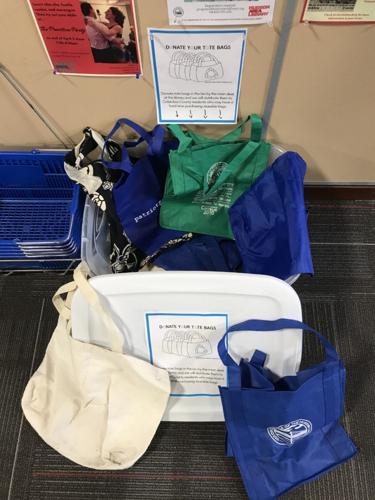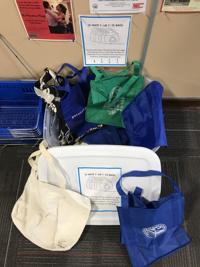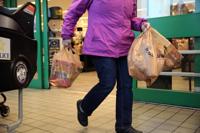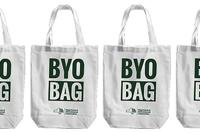A plastic bag ban goes into effect on March 1 in New York state, and local stores and consumers are making alternate plans.
The law bans all plastic carryout bags from distribution by anyone required to collect New York state sales tax.
In 2018, the Columbia County Board of Supervisors discussed banning single-use plastic retail bags, but decided to wait for a state law to be passed, 3rd Ward Hudson Supervisor Michael Chameides said.
“What was really clear in my research around it is that it was important that as the plastic ban goes into effect, it’s really important that people have access to reusable bags to sort of ease that transition,” Chameides said.
Chameides helped organize a tote bag collection to donate to those in need at the Hudson Area Library at 51 N Fifth St. and has collected more than 75 bags.
The Columbia County Department of Social Services is distributing the donated bags at its office at 25 Railroad Ave. to anyone who needs them. Social Services also purchased around 200 bags to distribute. The collection will continue as long as a need persists, Chameides said.
“Thank you to all the community members who are donating to this program,” Social Services Commissioner Robert Gibson said. “We have too many people struggling with basic essentials and this part of a larger effort to relieve the pressure.”
Stephanie Cowan, manager of the Price Chopper in Chatham, said she does not think the plastic bag ban will affect how much consumers purchase.
“We already have reusable bags at every register and on every end cap throughout our store,” Cowan said. “The only thing different is now you’re getting charged for paper bags and you’re no longer getting a 3-cent discount for bringing your own bags.”
Cowan said the store will charge 5 cents for paper bags without handles and 15 cents for paper bags with handles.
One store ahead of the curve, ALDI, at 300 Fairview Ave., has offered excess boxes and sold reusable bags to customers to carry their groceries home since the company came to the U.S. in 1976.
“Given our simple approach to retailing, one of the ways we help our customers save money is by encouraging them to bring their own shopping bags or to purchase a reusable, long-lasting ALDI bag,” according to the ALDI website. “The end result is that we not only save our customers money by avoiding adding the cost of the bag to our prices, but also precious resources.”
Walmart has committed to going 100% recyclable, reusable or industrially compostable by 2025, and will sell 98-cent reusable bags made of recycled plastic at checkout lanes.
Plastic shopping bags cannot be recycled at home, and can only be recycled with other film plastics. The 2009 New York State Plastic Bag Reduction, Reuse and Recycling Act requires stores with 10,000 square feet or more of retail space and chains operating five or more stores with greater than 5,000 square feet or retail space to provide a Film Plastic Recycling Program for customers.
More than 23 billion plastic bags are typically used each year in New York state. The state Department of Conservation’s -BYOBagNY campaign encourages consumers to keep reusable bags in their cars, purses and commuting bags, or by the door. Stores will not prevent customers from using a bag of any kind that has been brought for the purpose of carrying goods, so plastic bags saved up at home can be reused.
There are exemptions from the law for certain bags:
n Used solely to contain or wrap uncooked meat, fish, seafood, poultry, or other unwrapped food, flower, or plant
n Used by a customer solely to package items from bulk containers, including fruits, vegetables, grains, candy, small hardware items (such as nuts, bolts, and screws), live fish, or live insects
n Used solely to contain food sliced or prepared to order
n Used solely to contain a newspaper for delivery to a subscriber
n Sold in bulk quantities to a consumer at the point of sale that were specifically prepackaged in a manner to allow for bulk sale (for example, quantities of bags prepackaged in individual pre-sealed boxes) or prepackaged in individual boxes or containers for sale to a customer
n Sold as a trash bag
n Sold as a food storage bag, such as those in snack, sandwich, quart, and gallon sizes
n Used as a garment bag, such as those used by a dry cleaner or laundry service
n Provided by a restaurant, tavern, or similar food service establishment, as defined in the state sanitary code, to carry out or deliver food
n Provided by a pharmacy to carry prescription drugs
n A reusable bag, as that term is defined in proposed Part 351 draft regulations; or film plastic bag for which there is no reasonable or practical alternative for storing, containing or transporting items, as determined by the department.
Cities and counties are authorized by the law to adopt a 5-cent paper carry-out bag reduction fee. The fee does not apply to the Supplemental Nutrition Assitance Program and the Women, Infants and Children Program, or WIC.
Chameides said while he is glad the fee does not apply to these programs, reusable bags are still favorable to paper bags.
Columbia County and Greene County have not opted into this, but some retailers may impose their own fees. Ulster County signed a ban into law in October of 2018 and adopted a 5-cent fee.
Abby Hoover is a reporter for the Register-Star. Contact her at (518) 828-1616 ext. 2500 or ahoover@registerstar.com.
Johnson Newspapers 7.1













